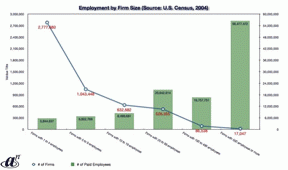You wouldn't have guessed it from listening to President Obama's State of the Union address, but small and/or new businesses aren't really the types of enterprises that need our recirculated stimulus money the most.
Mature businesses do.
Specifically, established businesses that cannot otherwise afford to hire new workers at a living wage -- particularly in America's most distressed communities.
Most people don't realize this, but 99% of American businesses are "small businesses". That is, only one in 100 business employs 500 or more workers, which is how the Small Business Administration (SBA) generally defines this term so often bandied about by politicians on both sides of the political spectrum.
So, it's reasonable to ask ourselves: If 99 of every 100 firms in America are small, what value does the term "small business" really have? Not much, actually.
The reality is, the value of the term of art "small business" is only political in nature; "smallness" suggests local, Mom-n-Pop, salt-of-the-earth, when in fact the one million small businesses President Obama proposed to help out in his address through a $30 billion investment of tax-payer money are not really representative of most small or new ventures.
In fact, three out of every four businesses have no employees at all! So, the vast majority of the businesses in our nation have zero employees with very little likelihood of ever hiring one. Perhaps that's why the average business size boasts a mere five employees.
The one million businesses Obama proposed assisting obtain bank loans to stay afloat are likely the same approximately one million firms that represent for-profit enterprises with ten or more employees on their payroll.
In his address, President Obama stated that "[w]e should start where most new jobs do -- in small businesses, companies that begin when . . . an entrepreneur takes a chance on a dream, or a worker decides it's time she became her own boss." But these types of start-ups represent the riskiest firms to invest in, particularly if the primary goal of this investment is net job growth beyond the short-term.
For a president who urged members of Congress to take a "common sense" approach to legislative action, the president's framing of entrepreneurship and micro-enterprise as generators of new jobs embraced common myth along the lines of Horatio Alger versus the bold pragmatism of FDR.
"Common sense" would be to invest in sustainable enterprises that create living wage jobs whose additions to the work force would produce a clear multiplier effect on our economy. In this more targeted approach, reinvestment of tax-payer dollars into such enterprises (that could include certain social service non-profits), new employment could be expedited that would not otherwise occur. Unfortunately, this is not what President Obama has proposed.
According to the Census' recent Business Dynamics Statistics data, the type of firms historically most likely to create net jobs are firms that have lasted over 25 years in business. Many new and large-scale businesses, respectively, traditionally create jobs, but lay off even more in the short-term. But President Obama probably didn't know this because his top advisors either didn't know this or, worse, felt this was politically irrelevant information.
Instead, the president resorted to reading from the chapter of the dog-eared political playbook written by what I dub the "Entrepreneurial Industrial Complex" and regurgitated the hackneyed "bootstrapping pioneer" rhetoric without nuance or reference to the very studies produced by his own federal agencies that suggest other more productive courses of action.
The diverse array of people who make up the Entrepreneurial Industrial Complex have insinuated themselves into otherwise well-meaning public policy discussions on how best to support entrepreneurs and other business owners flourish for the benefit our their local communities and the national economy.
This cohort consists of "pro-business" politicians, slick business evangelists like Donald Trump and Robert Kiyosaki (of Rich Dad, Poor Dad infamy), mainstream media figures, lobbyists and many fellows that abound within Beltway think-tanks, conservative and liberal alike who run from facts, substantive research and critical thought like the plague.
Based on 2004 data from the U.S. Census Bureau, there's about a one percent chance of a new start-up venture eventually employing 10 or more workers and surviving five years in business -- let alone becoming profitable. Of course, this probability assumes that the playing field is level and that social and economic disparities between entrepreneurs do not exist or are no longer relevant to viability in business. Sadly, the era of perfect equality of opportunity has not yet been ushered in. (Perhaps that's something Obama can work on if he's re-elected.)
(Note: You can view every article as one long page if you sign up as an Advocate Member, or higher).





